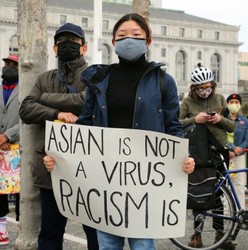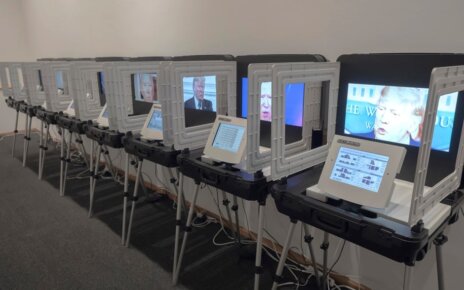Atlanta, Georgia, March 16. Eight people were killed in a series of mass shootings at three Asian-run spas, including six women of Asian descent, as reported by news outlets across the globe.
Many people have linked this incident to recent surges in Anti-Asian racism and violence since the beginning of the COVID-19 pandemic, including President Joe Biden and Vice President Kamala Harris, as per an official statement by the White House. According to a study based off police data by the Center for the Study of Hate and Extremism at California State University San Bernardino, hate crimes against Asian-Americans increased 145 percent in 2020.
People flocked to social media to express their frustration towards anti-Asian hate crimes, trending the hashtag #StopAsianHate. And, as the Wall Street Journal reported, protests are surfacing around the nation to push for an end to anti-Asian violence.
Monmouth students of Asian descent have also voiced their thoughts on the recent incident and its implications on race and discrimination in the United States.
“Racism and violence have been a long problem. It’s unacceptable to see the hate crimes against Asians being excused as some mass murderer ‘had a bad day,’ said Yancy Hu, a graduate student of computer science and President of the Chinese Student Association. “We all have to stand up and do our work to prevent this senseless violence inspired by hate and racism from happening again.”
Jessica Pak, a junior communication student of Korean descent, shares a similar sentiment. “It honestly made me so distraught,” Pak said. “I was really shocked and almost mad at the world after hearing about [the shootings]. I wouldn’t want that happening to my parents, because they used to own a dry cleaners together. Right next door our friends, who are also Korean, owned a nail salon. I pictured my parent’s business and the business next to them experiencing the same exact thing. I was like, ‘that would be awful if that happened to me.’ And it could have happened to me.”
Pak said that her mother, who immigrated to the United States in the late 1990s, has experienced microaggressions due to her race. Merriam-Webster Dictionary defines microaggressions as unintentional prejudice towards culturally marginalized groups.
“I’ve noticed that people are racist by accident,” Pak said. “[My mom] has a bit of an accent, and I notice that when we’re out in public and she is trying to communicate with someone, sometimes people will make fun of her and undermine what she’s saying. It’s those subtle acts of racism that get under my skin.”
Jennifer McGovern, Ph.D., Assistant Professor of Sociology, offered insight on the roots of this recent violence. “One of the things that sociologists have studied is that often times when there are problems or hardships in a society, people often look to blame other groups as a scapegoat,” she said. “Sometimes, problems are really complex and it’s hard to understand where they’re coming from or find out where to solve them. Right now, times are hard. There’s a lot going on in the world and I think that Asians have become a target because the Coronavirus originally started in China. If people don’t know how to make sense of this problem that’s affected their lives but know it started in China, it’s almost easier for people and that’s why over the past year it’s lashed out.”
Junior communication and theatre student Nicholas Sewell, who is of Korean descent, expressed his opinions on the recent incident in Atlanta and its implications on the Asian-American community. “I’ve been trying my hardest to distance myself from it all—not because I don’t care or think it’s unimportant, but because it’s too much,” he said. “I’m taking 18 credits, I have an internship, and I’m performing for MU players. If I focus on every incident that’s happening, I wouldn’t be able to give myself the time to focus on my academics. It infuriates me that I have to do that to get through the day and school.”
Sewell, who was adopted by Caucasian parents, also spoke about his experiences growing up in the predominately white neighborhood of Millbrook, New York.
“I was raised by an Italian mother,” he said. “I never really had rice growing up as a kid, or Asian foods in general. I grew up ‘white,’ which makes me almost feel like I don’t deserve to talk about this stuff sometimes because I know Asians are considered the model minority and I see that through how I’m treated vs how other people are treated. Even though I’ve had my fair share of racist experiences, I shrug them off. I know I shouldn’t, but I decided to say it’s not worth it.”
He continued, “When it comes to these movements, I hope my mom says, ‘I have an Asian son, maybe I can be more attentive towards this.’ But at the same time, I don’t want it to be that the Asian movement matters more than the Black Lives Matter movements because frankly, I think those are more important. They came up first and are more prevalent and need to be addressed just as much. I hope society doesn’t sweep the Blacks under the rug.”
Pak and McGovern also noticed a parallel between the Atlanta shootings and the murder of George Floyd in June 2020 after a white police officer kneeled on his neck.
“It’s a shame that a lot of acts of racism, not only towards Asian people, are circulating the world constantly even with the Black Lives Matter movement,” Pak said. “Even though I’m not an African-American person, I feel for them because racism is a lot more prevalent than people view it to be.”
McGovern said that while Asian people and Black people experience racism differently, they are both a part of the same system that shows that some lives and people are valued more than others. “Instead of saying, ‘We’re Asian, so we experience racism this way,’ or ‘We’re Black, we experience it this way,’ students and people can join together and say we all want to be seen in our humanity and treated as equal. And that means Black Lives Matter shouldn’t compete with Asian Lives Matter. They want to work together because they’re all facing issues,” McGovern said.
McGovern offered ways that individuals can work together to end the issue of racism and violence towards minority groups. McGovern said that on a big level, individuals can vote in local and state elections for politicians who can alleviate these issues through policies such as harsher penalties for hate crimes and programs that help protect marginalized groups.
“I think it’s hard because ending racism seems so big and so that’s why people don’t always want to take steps to do it,” McGovern said. “One of the reasons I think Asians in particular have been easy targets is because we have this cultural narrative of them as almost weak and submissive. Asians are the butt of a lot of jokes. Sometimes when we have those ideas circulating a society, it becomes easy to target that group. On a small individual level, we can examine our language and our jokes. Maybe we can think a little more closely and make sure that we make an effort to humanize Asian-Americans as we would want to humanize any group.”
McGovern also said that she would like to see more courses and programs offered at Monmouth University that enable the community to learn more about how racism affects all groups. “I think a lot of the programs that the University has done in the past year has been hyper-focused on Black/white racism given what was going on in the news. I think we as a University can be a little more expansive in how we think about racism,” she said.
On March 17, President Patrick Leahy sent an email to the Monmouth community condemning the Atlanta shootings. “In keeping with our commitment to building a more antiracist community, Monmouth University firmly denounces racially motivated and xenophobic acts of harassment and violence, and proudly stands in solidarity with our Asian, Asian American, Desi, and Pacific Islander community members,” he wrote. “I want to encourage all members of the campus community to intervene as active bystanders when you witness bias, to continue to stay informed about the world around us, and to listen authentically to one another across lines of difference about our lived experiences and shared humanity.”
Sewell, however, is not optimistic that racism can be ended so quickly. “At the end of the day, we as citizens cannot do anything. And that’s infuriating, but it’s the harsh reality of how our society works,” he said. “Black Lives Matter is the biggest revolution and outrage that our generation has had. The fact that nothing has changed for Black Lives Matter is very telling of how little [society] cares. The only real change that can be made is a drastic change. The stonewall [riots] were in 1969, and same sex marriage was in 2015—that’s 46 years of nothing. I don’t want to be 70 and find that we just took one small step towards stopping Asian violence. It needs to be one giant step.”
Pak and Sewell also commented on the social media advocacy that is prevalent among college students. “I really enjoy the social media activism that’s been going on because it shows to me who actually cares about this issue and who actually doesn’t,” Pak said. “A lot of my friends who are Asian as well don’t enjoy the social media activism because most of the time it doesn’t actually reflect [people’s] true thoughts and actions towards Asian people. There’s a huge difference between posting on social media that you’re not a racist and actually not being a racist in real life.”
“Social media advocacy is a good start, but I don’t think it does anything at the end of the day,” Sewell echoed.
Outside of social media, Pak said that becoming more aware of and expressing interest in different backgrounds and cultures is a big step towards equality. “Empathy and kindness towards another one’s culture, although you may be different, is very important. Everyone should do that for everyone regardless of whatever culture they are,” she said.
Meanwhile, Hu calls for the AAPI (Asian Americans and Pacific Islanders) community to continue fighting for an end to racism and violence. “We’ve seen many racist talks, Tweets, and blogs defended as freedom of speech by government officials, media, etc. We should at least have a sense of the boundary between racism and freedom of speech,” she said. “To the AAPI Community, stop being quiet and get our voice heard, because being quiet get you nothing but systematical and long last discrimination.”
PHOTO COURTESY of Yancy Hu
IMAGE TAKEN from @meena on Instagram




